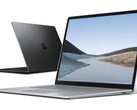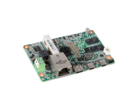Intel has been the traditional CPU of choice at least when it comes to gaming laptops. AMD didn't quite have a competing offering that can dethrone Intel's H-series 45W chips. That may change this year with the launch of the Renoir Ryzen 4000 APUs.
We have discussed about AMD's lineup of H-series offerings during the company's CES 2020 keynote. Back then, we said that AMD would be launching a Ryzen 9 SKU as well. Now, the company has offered more details into the Ryzen 9 4900H and Ryzen 9 4900HS, and how they fare when compared to Intel's offerings such as the Core i9-9880H.
AMD Ryzen 9 4900H
The Ryzen 9 4900H features 8 cores and 16 threads just like the Ryzen 7 4800H but offers higher base and boost clocks at 3.3 GHz and 4.4 GHz, respectively. There are 8 Vega cores on offer clocked at a 1,750 MHz frequency. All this is rated at a 45W TDP. OEMs can configure this TDP at 35W, but that doesn't make it a HS processor.
AMD Ryzen HS series
AMD is pitching the HS series as special APUs that conform to certain standards, similar to what Intel did with Project Athena. As such, the HS APUs are set at a default power consumption of 35W only and OEMs will have to ensure their designs are able to offer sustained performance at this TDP. This also means that AMD will be working only with select OEMs on notebook design and testing. The Asus ROG Zephyrus G14 is one such offering.
AMD indicates three HS processors in the offing. Of these, only the Ryzen 9 4900HS differs a bit from its non-H variant, the Ryzen 9 4900H. The 4900HS offers 8 cores and 16 threads, and a 3 GHz base and 4.3 GHz boost. A Vega 8 iGPU clocked at 1,750 MHz is available and the entire package is rated at a 35W TDP.
The Ryzen 7 4800HS and Ryzen 5 4600HS are merely HS variants of the Ryzen 7 4800H and the Ryzen 5 4600H and sport similar corresponding specs.
| SKU | Cores/Threads | Boost/Base Clock (GHz) | Cache (MB) | GPU Cores | GPU Frequency (MHz) | TDP (W) |
|---|---|---|---|---|---|---|
| Ryzen 9 4900H | 8/16 | 4.4/3.3 | 12 | 8 | 1750 | 45 |
| Ryzen 9 4900HS | 8/16 | 4.3/3.0 | 12 | 8 | 1750 | 35 |
| Ryzen 7 4800H | 8/16 | 4.2/2.9 | 12 | 7 | 1600 | 45 |
| Ryzen 7 4800HS | 8/16 | 4.2/2.9 | 12 | 7 | 1600 | 35 |
| Ryzen 5 4600H | 6/12 | 4.0/3.0 | 11 | 6 | 1500 | 45 |
| Ryzen 5 4600HS | 6/12 | 4.0/3.0 | 11 | 6 | 1500 | 35 |
AMD showed off some comparative metrics of the Ryzen 9 4900HS with the Core i9-9880H. Overall, the Ryzen 9 4900HS shows significant performance gains in most benchmarks with the only regression being shown in PCMark 10's Digital Content Creation test.
We have previously reported about a leaked Cinebench R15 benchmark in which even the Ryzen 7 4800H surpassed most Core i9-9980HK results, so we would believe that Renoir's multicore prowess will come in very handy for productivity on the move.
When paired with the RTX 2060 Max-Q, the Ryzen 9 4900HS seemed to have put up an good numbers in eSports and AAA games. Of course, these are AMD's tests and we will reserve judgement till we get to benchmark this processor ourselves. Till then, check out the benchmarks in the slides below.
Source(s)
AMD Ryzen Mobile Tech Day Keynote


 Deutsch
Deutsch English
English Español
Español Français
Français Italiano
Italiano Nederlands
Nederlands Polski
Polski Português
Português Русский
Русский Türkçe
Türkçe Svenska
Svenska Chinese
Chinese Magyar
Magyar
































